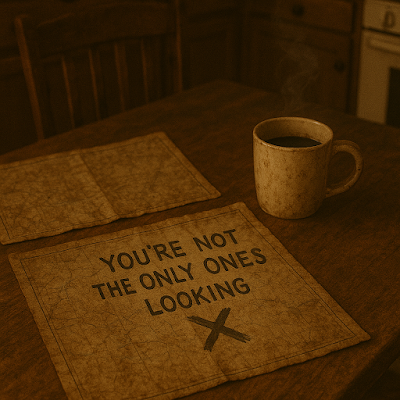The next morning, Ronny was up before the sun.
It had become a habit—waking early, not because he had somewhere to be,
but because sleep didn’t come like it used to. Most mornings he fed the birds,
made coffee, and flipped through the paper without really reading it. But
today, the map sat on the kitchen table like it had something to say.
He poured a mug of black coffee, settled into the same chair he’d eaten
thousands of meals in, and opened the smaller, hand-drawn map once more.
Last night, it had seemed like a curiosity. Now it felt like a calling.
The paper was brittle, creased in quarters, the graphite faded in some
places to the point of vanishing. He squinted at the top left corner, noticing
something he hadn’t seen before. It was faint—almost ghostlike—but there, pressed
into the margin just above a rough sketch of a creek bend, was a name.
M.E. Dalton
Not written in pencil. Indented, like it had been signed with a dry pen
or the pressure of a fingernail. He ran his fingers across the groove.
Dalton.
It wasn’t a name he knew well, but it rang faintly in the back of his
mind. Maybe a student from years ago, maybe from one of the old family names
that had filtered through Henderson over the generations. He reached for the
small spiral notebook he kept by the phone—Rebecca had always called it “the
backup brain”—and jotted the name down.
If Maya could find something, it would be her.
He was halfway through his eggs when his phone buzzed.
Maya Caldwell
[8:12 AM]
Newspaper archives from June 1939—missing person report filed on Wayne
Ellis. That’s your grandfather, right? Also found a mention of someone named
Margie Dalton. Want me to call?
Ronny stared at the screen. That was fast. She must’ve gone digging the
second the library opened.
He tapped back:
[8:14 AM]
Yes. Call when you can. Definitely my grandfather. Margie Dalton might be
our M.E. Dalton.
The phone rang seconds later.
“Morning,” Maya said, skipping greetings. “You’re not gonna believe
this.”
“I’ll try,” Ronny said, wiping his hands on a napkin. “What’d you find?”
“So, Henderson Evening Gleaner, June 13th, 1939. Headline buried
inside reads: ‘Local Man Missing; Family Concerned.’ Says your grandfather, Wayne Ellis, was last seen leaving the family farm near Robards around 4:30 p.m.
Witnesses report seeing him headed toward the ridge trail behind Collier’s
pasture.”
“That’s not far from the area marked on the map.”
“Exactly. And here’s where it gets better. A few inches down the same
page—short paragraph about a young woman named Margie E. Dalton. Twenty years
old. Reported missing by her employer, of all people. Says she didn’t show up
to her job as a filing clerk for the county assessor’s office. Also, last seen
near the south road between Slaughters and Rumsey. That’s maybe ten miles from
where your grandfather vanished.”
Ronny’s grip on the phone tightened. “Same day?”
“Same day. Same issue of the paper.”
He leaned back in his chair. “Do you think they disappeared together?”
“Could be,” Maya said. “Or they ran into the same trouble.”
“You said she worked at the assessor’s office. That’d give her access to
land maps, ownership records...”
“And she might’ve known about something worth hiding—or finding,” Maya
finished.
There was a pause.
“You still have the map with you?” she asked.
“Right in front of me.”
“Check the bottom-right corner. Anything look like a cabin or initials?”
Ronny bent closer. There, near the base of a sketched ridge, almost like
an afterthought, were the letters:
M.D.
He read them aloud.
Maya exhaled on the other end. “She didn’t just draw this map, Ronny. I
think she meant for someone to follow it.”
Later that afternoon, Ronny met Maya at the library.
She had laid out a collection of plat books, faded aerial photos, and a
single plastic sleeve containing the newspaper clipping she’d found. The photo
in the article showed a young woman—Margie Dalton—with tightly pinned hair and
a cautious smile, the kind people wore in official portraits.
“She was the daughter of Ernest Dalton, owned a small orchard out near
Rayburn Creek,” Maya explained. “Family’s long gone. No known descendants.
Margie vanished in June 1939 and was never found. Case went cold before summer
ended. Your grandfather reappeared three days later and wouldn’t talk about
it.”
Ronny stared at the photo. She looked like someone he could’ve passed in
a grocery store and never thought twice about. Except she was a ghost now—tied
to a map, a missing person’s report, and maybe something more.
Maya looked at him. “So what now?”
Ronny folded the map carefully and slid it into a file folder. “Now I
think I'll pay a visit to Rayburn Creek.”
Maya raised an eyebrow. “You mean we?”
He grinned. “Unless you’d rather stay here and file overdue book
notices.”
She rolled her eyes and grabbed her coat.











